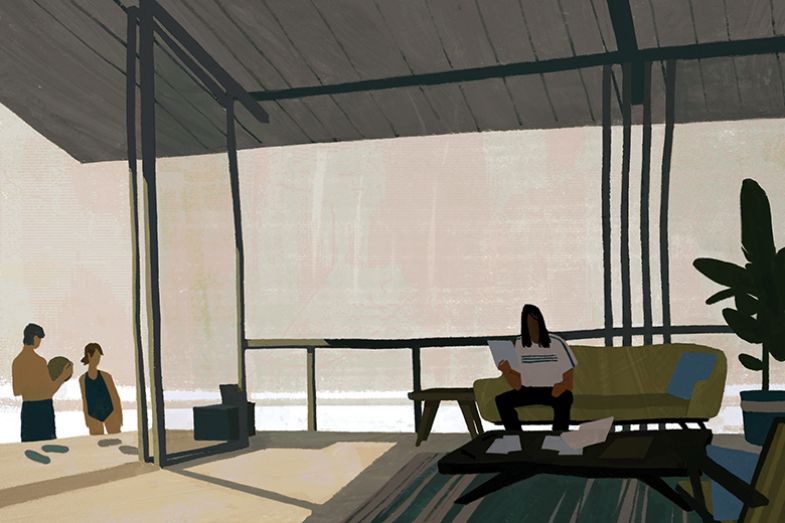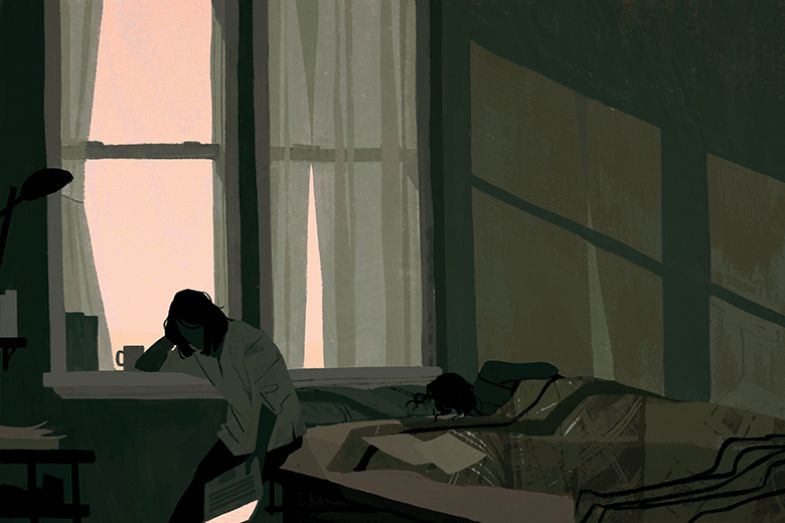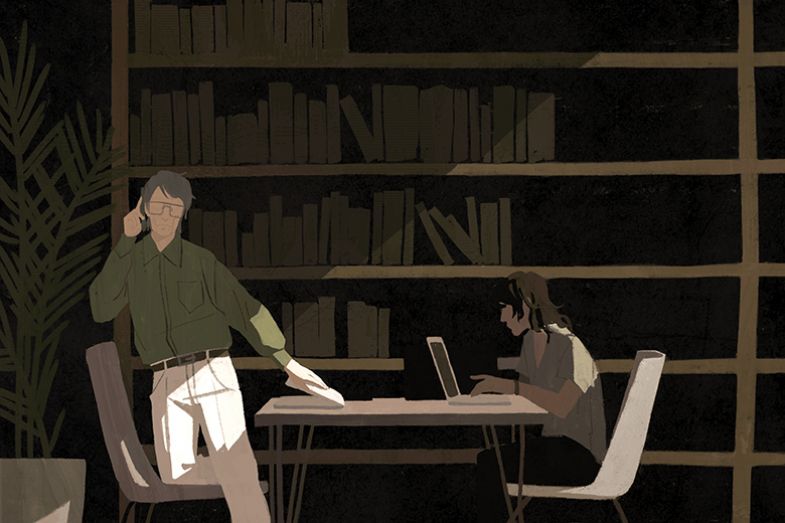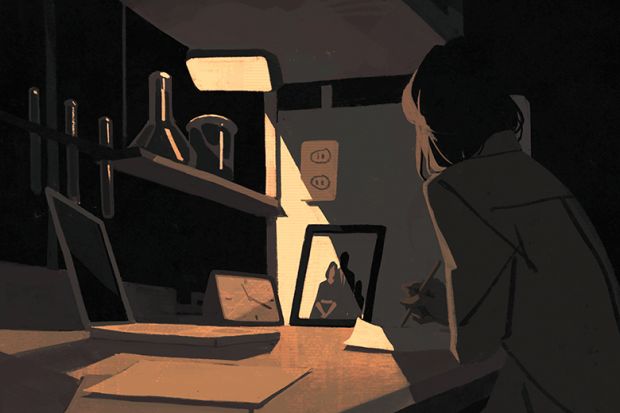‘Personal commitments teach you that achievement is a zero-sum game’
There’s an old saying in academia: it’s important to have a good work-work balance. Science never sleeps, so by implication neither should you – or at least, if you do, keep it short and try to dream about your next experiment. The message passed down from one generation of scholars to the next is to channel Gordon Gekko or die trying.
This was brought to prominence again in November when the Cambridge classicist and broadcaster Mary Beard admitted on Twitter (somewhat ruefully, I thought) to working 100 hours a week. 100 hours! Her tweet was met with a combination of awe and horror. Is this really what it takes to be successful?
I don’t think it is, but I can see why it looks that way. Bureaucrats care most about how “productive” we are, measured mainly by the quantity of articles we publish in high-ranking, peer-reviewed journals and the volume of research funding we attract.
But that’s just for starters. We’re also expected to be managers, administrators, policymakers, communicators, accountants, teachers, mentors, prizewinners, specialists, generalists and role models. This creates a steady pressure on researchers to be constantly doing everything, from writing and reviewing papers to marking and supervising students to speaking to journalists and policymakers.
I’m the first to admit that as an early career researcher I embraced the culture of overwork with both arms. It’s what all my contemporaries were doing. It’s what my mentors and role models expected. And the competition was addictive – stressful as hell but occasionally exhilarating.
I didn’t work anything like 100 hours a week, but I was definitely doing 60+. You’d cram in 10 hours a day Monday to Friday, plus another 10 over the weekend, and then squeeze a bit more in wherever possible. Of course, I was only paid for about 40 hours, but, like many junior researchers on temporary “soft money”, I treated my salary as paying for borrowed time to invest in future success. When your professional status is a ticking bomb, you sprint.
When I finally got a permanent academic job, the pressure just got worse. Tenure doesn’t leave a whole lot of time for doing anything else, not least actually thinking, which in some long-forgotten era used to be the primary job of the scholar.
But my approach completely changed when I had children. I vowed not to become one of those depressing “high-achieving” academics whose kids were raised by nannies. Personal commitments teach you that achievement is a zero-sum game; is there really any point accomplishing great things in one part of your life if it means destroying everything else? Did I want to turn into that famous colleague I once saw writing a grant application at his child’s birthday party? Or the other who forgot their child’s birthday altogether?
So now I strictly work 40-45 hours a week, only occasionally in the evenings and almost never at weekends. Do I feel the urge to work more hours? Sure. The work is important and I enjoy most of it. But one of the “burdens of command”, as a senior academic, is to look up every so often at the broader landscape and understand the example you are setting.
Of course, if a senior colleague chooses to work 100 hours a week, nobody can stop them, least of all me. But I’d much rather that they didn’t talk about it or expect anyone else to do it – either explicitly, by ordering them to, or implicitly, by valuing researchers who “produce” more.
Oh, the hypocrisy, I hear you cry! But while, yes, I got to this position by overworking, the cycle must be broken. Working too much is bad for physical and mental health, not to mention research quality.
An overwork footprint is like a carbon footprint. The bigger it is, the more you owe back to the environment. In the same way, academics who work ridiculous hours hold the greatest responsibility for eliminating the pressure on others to do the same.
Chris Chambers is professor of cognitive neuroscience at Cardiff University.
‘The line between work and rest has become invisible’
I am writing these words at 7.30pm on the last Friday of winter break. I could be playing with my child or preparing dinner. Instead, I am giving my workaholic tendencies free rein, trying to eke out a few more hundred words before fatigue forces an end to my day.
Another version of this picture: I am lying in bed with my laptop, an Aperol spritz on the headboard, my son watching music videos next to me. Distracted, I read text messages and odd bits of news, check my email incessantly, and will myself to do something I love: write.
I don’t know how many hours a week I work. The line between work and rest was fuzzy in graduate school. Over the years, it has become downright invisible. Some tasks are clear: grading is work. So are committee meetings and anything involving grants or personnel. Teaching is work, though it holds the potential for joy and fulfilment. But if, over breakfast, I read a Middle English poem I’ll be teaching the next day, how do I file that hour? If I settle into a hot bath with a novel that I’m due to review for a newspaper, is that work or pleasure? Is a conference labour? Even if hearing stimulating talks feels like a vacation? And what about the dinners and the receptions?
As I devote more of my time to public writing, it becomes even harder to ascertain what counts. My job neither measures nor rewards outreach, but this is also true for research output. Should I consider both types of writing hobbies now, even if they improve the teaching and grantsmanship that the university does notice? Or should I simply count my blessings that no bureaucrat has thought to count my publications?
Flexible schedules are academia’s gift and curse. When I began my tenure-track position in Bonn in 2014, less than 30 per cent of German mothers of children under 15 worked full time. I reflected often on how lucky I was to be able to do daycare runs when it was my turn, then work a few hours after my son was in bed to make up for what I couldn’t finish in the office. I was exhausted, gained weight and rarely went a fortnight without being sick, but I also spent precious time with my child and earned a permanent professorship. (And still, I was an exception: in 2019, less than 20 per cent of German professors were women.)
The habits I cemented during this period served me poorly after promotion, when my teaching and service doubled. I would face my computer most evenings to “get just one more thing done”. Too tired to focus, I stretched 15-minute tasks into hours of aimless distraction. Was this work, staring at a screen hoping to be productive long after my brain had given up? Was it work when I did the same thing the next day at the office, after another night of poor sleep? It was a luxury to work whenever, wherever I wanted, but I never felt I had done enough for the day. I lived under the guilty shadow of my endless to-do list. A calling turned into a burnout.
I am unlikely to be able to put a clear number to the hours I work any time soon; my labour and my passions are still too entwined. But I do have a goal moving forward: to count the number of hours a week that are unequivocally not work. How much of my life is devoted to sleep and exercise, to family and friends, to hobbies that will never touch my CV? In other words, who am I beyond my productivity?
Irina Dumitrescu is professor of English medieval studies at the University of Bonn.

‘My hysterical productivity contributed to an environment of overwork’
I had quite an unpleasant conversation with a colleague shortly after finishing my PhD. He said that my pace of work was too high and that this made it “unfair” for everyone else. It was true that my alarm was set for 4.30am, and that throughout the last year or so of my candidature I was often on campus by 5 o’clock. My publications, alongside my dissertation, were fast and furiously produced.
What I was also doing, unlike my colleague, was raising a child. My son was only with me every second week, which certainly made it easier, but it still demanded a lot of me. During the weeks I had him, I worked at the kitchen bench in my tiny flat before he was up, and on afternoons without soccer training, I simultaneously wrote my dissertation and supervised his homework. Sydney is one of the least affordable cities in the world, so my paid work was also substantial: usually the maximum permitted by my scholarship.
I worked frantically to make myself as competitive as possible because I could afford very few years without stable work before being obliged to return to the back-up career I’d established before commencing my PhD. What to my colleague seemed unfair to me felt like responsible parenting.
It was actually, looking back on it, kind of hellish. But my adrenaline-fuelled habits did not – indeed, could not – change when I started my permanent job. It seems amazing to me now that the story doesn’t end in tragedy. Instead, surviving the first years of teaching, I learned – with some significant assistance – to slow it down. A bit. I am still no pin-up for “slow scholarship”, but I am gradually learning that deep thinking, thorough reading and considered analysis just don’t happen frantically.
As a member of my union’s branch committee, I have recently been negotiating revisions to the academic workload model at my institution. I am struck by the descent of university workload into what resembles the “pushing system” that historian Edward Baptist described on 19th-century cotton plantations. The logic was that what a slave picked one day became their minimum for the next, while the fastest slave working the rows of cotton set the pace for everyone. Failure to meet escalating quotas resulted in unspeakable violence. Spectacular increases in productivity sat atop physical and psychological torture.
It would be wrong to compare academics to slaves, given our myriad privileges. But our modern management follows the same logic as the pushing system. Whenever we find a way to make our workload achievable – flipping classrooms, voice-recording essay feedback, getting up ever earlier to find quiet research time – the workload accelerates because there is always someone else getting up even earlier, achieving even more, even better – and that person may be your younger self!
But my own newfound capacity for reflection niggles a little at my conscience because I suspect that my colleague was right: my hysterical productivity contributed to an environment of overwork for us all. But he was also wrong. The pushing system was never the fault of the fastest slave but of the overseer holding the whip.
Moreover, unlike slave labour, academic work is pleasurable and fulfilling, and regulating one another’s work habits is a melancholy prospect. Instead, we who have so much more agency than slaves did need to use our collective strength – our unions, largely – to fight the pushing system itself.
Hannah Forsyth is senior lecturer in history at the Australian Catholic University and currently holds a visiting position at the University of Cambridge.
‘Why force myself to wake up early if my work doesn’t benefit?’
At a recent cross-disciplinary PhD training event, an instructor asked us to reflect on something we’d like to change about our working practices. When I said “I sleep too much”, someone behind me laughed. “I wish I had that problem!” they said.
I’ll admit that my remark was partly tongue-in-cheek (who wants to share their deepest insecurities with a group of strangers?), but I was also partly serious. I’ve felt guilty about it for years. Partly, I think, this comes from a desire to defend what I do. English literature was a joked-about subject among my undergraduate and even master’s-level scientist friends, who compared the vast amount of contact hours their subject demanded to our few, often non-compulsory ones, and concluded that our degrees were less taxing. It was hard not to feel offended, but harder still to defend it when they were in the lab at 9am, while I was still asleep.
I tried various strategies. One year, I decided I would do eight hours of work a day, no exceptions. My revision notes from that time are scrawled with sums, subtracting toilet and lunch breaks (and frequently time spent daydreaming), in pursuit of that arbitrary mark. It worked: I did well. And, even better, if I finished early in the day, I felt no guilt about taking the evening off.
Without that decision, I suspect I would have been more susceptible to the mass stress liable to sweep the undergraduate community at exam time: that soul-destroyingly unhealthy atmosphere encapsulated by the aggressive notes warning off any newcomers left by people who briefly leave their library desks to use the bathroom or go for a walk (and who sometimes nap in the library, even if their rooms are close by).
I thought about continuing this approach when I started my PhD. It’s equivalent to a job, I reasoned, so I should treat it like one: Monday to Friday, nine to five. That first year I came to realise, however, that I work much better in the afternoon than I do in the morning. Moreover, surely one of the benefits of doing a PhD in the first place is the flexibility. Why force myself to wake up earlier than I have to if my work doesn’t benefit from doing so? Why not take Friday off to see an exhibition off-peak, and work on Saturday if I want to?
This year, then, I’ve made a conscious decision to re-examine my working patterns. I’ve never been good at working late in the evening, so now I don’t. I set aside strict time for teaching and teaching preparation, because otherwise it expands like a B-movie monster to fill all my available time and more, until suddenly it’s midnight and I’m still working on a scene-by-scene breakdown of Volpone.
For this, I am thankful to the Queen Mary branch of the University and College Union, which campaigned to get teaching assistants a precise breakdown of what we are paid for: I feel less like a bad teacher knowing I am contracted for a certain amount of preparation. My daily commute is reserved for reading for pleasure, and I usually read before bed, too. If my attention is flagging, I do some admin (the “email hour” after lunch is excellent for this). But if I’m not going to be productive and I don’t have commitments, I leave. I’m a big believer in letting whatever I’m working on percolate away at the back of the brain.
But even if cooking dinner, volunteering or seeing friends doesn’t magically resolve the knotty PhD question I’m grappling with – and it is amazing how often it does – it reminds me that my work is not my whole life. It reminds me not to sleep in the library.
Alice Wickenden is a PhD student in English at Queen Mary University of London.

‘Who actually counts the number of hours they work anyway?’
Academics in essence run small businesses. But instead of measuring success using conventional metrics such as revenue, profit margins and growth, we compare ourselves through our scientific impact.
It is important to remember that, like small businesses, academic groups have an identity – a brand. Historically, that brand was determined by four factors. In decreasing importance, these were quality of publications (journal prestige, total citations, number of downloads), quality of group alumni, value of grants won (and, hence, group size) and conference interactions. I’d like to think that these factors are still the primary building blocks of a good reputation. After all, we all have the same mission: to make observations about chemical systems that advance our fundamental understanding of the universe.
Today, however, we have an extra weapon in our arsenal: social media. This enables rapid contact between the group leader (the CEO) and the outside world and has become an essential – and largely beneficial – part of academic brand-building. We are even finding ways to hold virtual poster sessions, enabling the public distribution of science to a wide community of onlookers without the cost of flights, hotels and per diems associated with conferences (although physical conferences still have their value, of course).
Brands make decisions – conscious or not – about their outward-facing identities. Consider fashion brands such as Chanel, Dior and Prada. These “classics” are somewhat conservative: think “high quality, high price, high fashion”. Then there are companies operating in the same economic space but with vastly different branding approaches. Dolce & Gabbana, for example, seems to deliberately court controversy, voicing opinions and releasing promotional content that provoke argument and anger. Both approaches have led to highly profitable companies.
The social media venue that scientists use above all to advertise and build their brands is Twitter. In general, academics post three types of tweets. The first category is complaints about the job (some component of service, teaching or research). The second is boasts about success (papers, grant awards, graduations and so on). And the third is deliberate controversy-stoking, by voicing opinions that cannot be conveyed in any conventional scientific literary format.
Tweets about working excessively long hours fall into that third category. Working hours are a choice. To put it succinctly, some people spend their “fun time” doing work, while the rest of the normal world spend their fun time not doing work. Both of these approaches can be successful.
Personally, I don’t have a particular view on how many daily or weekly hours of work is appropriate since every day in this job is different. Some days I get out of the office early. Other days I get out very, very late. But who actually counts the number of hours they work anyway? Personally, I’d much rather count the hours that I do not work.
Moreover, the nuances of issues like this are typically lost in ego-fuelled, 280-character exchanges. That is why, in my view, folk like Lee Cronin – who controversially tweeted last summer that he was more worried about having “enough time to discover stuff” than about work-life balance – do themselves no favours by engaging in such category-three discussions.
But perhaps, after all, they are just trying to be a little more Dolce than Dior.
Christopher Hendon is assistant professor of computational materials chemistry at the University of Oregon.
‘It’s not always useful to measure our present against the most productive chapter of our past’
When I was in graduate school, one of my professors told me something I’ve never forgotten. She said that the best thing about academia is the flexibility. A lot of academic work is portable. We can mark papers on the beach and read scholarship in our bedrooms. But, she added, this flexibility is also a kind of curse; because even when we ought to be relaxing on vacation, or getting some necessary rest, we can never escape the feeling that we could – and really should – be getting some work done.
I’ve since come to recognise that this nagging sense of professional guilt is a near permanent fixture of academic life. Most of us talk about time away from work as time wasted. Weekends spent with friends keep us from our research. Holidays are squandered on family, when we could be doing course prep. No matter what we are doing, no matter how worthwhile or necessary the activity, as academics we always seem to be mourning the loss of time we could have spent working.
One way we respond to this feeling is to seek out strategies for maximising our time, or tips for improving our efficiency. We turn to the academic productivity gospel to find the shortest pathways to publication and promotion. But maybe a lack of productivity is not our main problem. Perhaps we need instead to consider why it is so hard for academics to be at peace with their level of production. What accounts for this pathological feeling that we are never, ever getting enough work done?
In part, this feeling that our jobs are never finished is simply a true insight about the nature of academic work. There are always more questions to research. We could endlessly redesign our courses. Our lecture notes can always be updated. The students we supervise could always use more feedback and more attention. Most of the work we do as academics is – structurally speaking – endless. Academia is an insatiable beast: it will consume as much time and energy as one is willing to give it. Its appetite will never be exhausted by our efforts, even if we exhaust ourselves by feeding it.
But there are other causes of our work-related guilt too, and these can be managed.
One is the ghost of past productivity. We all have memories of a time – a golden age – when we were able to work all day and late into the night, allowing us to complete truly heroic amounts of work in short spans of time. Such memories haunt us. I am a married father of two, with teaching and service commitments; I cannot – no matter how hard I try – recapture the working lifestyle of that unencumbered twentysomething graduate student I used to be. It’s not always useful or fair to measure our present against the most productive chapter of our past.
Another problem is competition. We often look to our peers to measure our own productivity. Are they publishing more than we are? Have they secured a more prestigious post? Some level of competition will always be present in academia, but we should also be cautious when comparing careers. How often, for example, do we compare apples with oranges? It’s important for us to remember how structural conditions enable certain kinds of success. Teaching loads and service responsibilities, for example, vary widely between institutions. Those colleagues who always seem to be outpacing you may literally have more hours in their day to do the work.
As academics, we should be self-critical about our desire for productivity. For our own good, we should find meaningful ways of measuring the worth of our work. But if we always find ourselves wanting, perhaps it is not our performance, but rather our standards, that need to be adjusted.
Andrew Moore is director and associate professor in the great books programme at St Thomas University, New Brunswick.

‘Academic independence can all too easily slide into presenteeism’
If the December university “closed” period already feels like a very distant memory, that is probably because you have been working too hard to make up for the day or two you took off to spend with friends, family or canine/feline companions.
Or perhaps you didn’t even get to do that. Even though their university was officially closed, many lecturers will have felt obliged to field email enquiries from students, other academics and even, sometimes, university managers and administrators – and, in responding, they will have generated still more traffic. Those who exercised more restraint will probably still have checked their account, if only to filter out non-urgent business. And most will have undertaken some sort of professional activity, such as marking or writing.
The impact of this open-all-hours university culture is pernicious and needs to be more vigorously resisted. While universities may try to instil codes of practice regarding electronic communications, specifying out-of-hours periods and reasonable time frames for responses, strict policing is not possible, or perhaps even desirable. Academics have long held sacrosanct the flexibility of their working hours. Early birds and night owls alike value the freedom to read, write and think at the times that suit them best. They appreciate being able to fit their duties around their personal lives, health needs or caring responsibilities (whether for children, the sick or the elderly). Departments that seek to introduce fixed working hours and recorded annual leave are criticised for imposing a clocking-in, factory-like environment.
However, academic independence can all too easily slide into presenteeism, with individuals feeling pressurised to work excessively long hours. This is particularly the case for probationary early career lecturers and for those on precarious contracts seeking more permanent positions. But it is also true for those aiming for promotion, and for those at the opposite end of the spectrum, who, after decades of service, feel they have to prove their indispensability or risk being pushed into early retirement.
Management incentives such as performance-related pay and staff bonuses can exacerbate presenteeism further. And, typically, women, who are still much more likely to assume caring roles, are disproportionately disadvantaged by this culture, and are more likely to find that their careers have stalled. The academic gender pay gap confirms this.
Workload allocation models rarely account for the actual hours spent on specific responsibilities and tasks, but accurately measuring our own working hours proves equally challenging. Do we include time spent reading and thinking (both essential components of the research process)? What about travel to and from conferences? Or time spent discussing aspects of our jobs over coffee or dinner with colleagues? How do external commitments (such as examining or consultancy or media work) fit into our calculations?
Even if we convince ourselves that we have succeeded in limiting our evening and weekend work, do we actually take our full annual leave entitlement, uninterrupted by the demands of email and social media? This can be well-nigh impossible. Academics are generally not allowed to take leave in term time, and exam boards, admissions, research and conferences all make huge inroads into the “vacation” periods.
If we value flexibility in our working hours, then we need to self-regulate, for our own sake and, more importantly, for the sakes of our peers. Trip notes and email response times signal absences and availability, making our working practices visible to all: we need to think about the message that we are communicating to our colleagues, administrators, students and managers.
Our own presenteeism raises the stakes and puts pressure on others to conform, sometimes to the detriment of their physical or mental health. What is the use of academic independence if the only alternative to working is guilt, opprobrium and flat career trajectories?
Diane Watt is professor of medieval literature at the University of Surrey.
Register to continue
Why register?
- Registration is free and only takes a moment
- Once registered, you can read 3 articles a month
- Sign up for our newsletter
Subscribe
Or subscribe for unlimited access to:
- Unlimited access to news, views, insights & reviews
- Digital editions
- Digital access to THE’s university and college rankings analysis
Already registered or a current subscriber? Login











